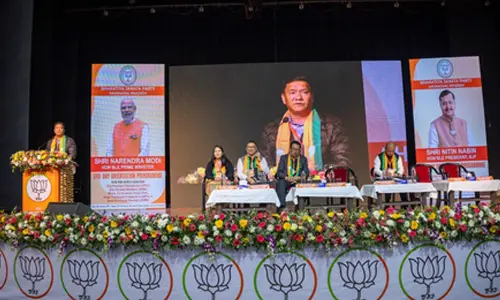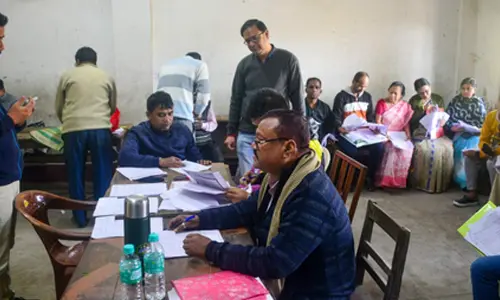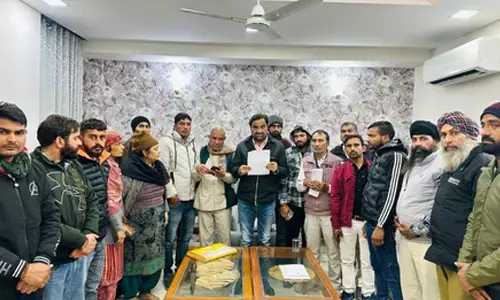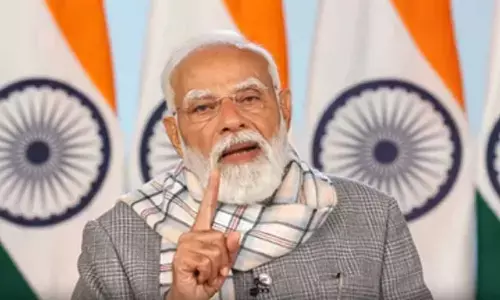Constitution does not give freedom of goondaism

The anti-national and Islamic militant elements masquerading as students of the universities such as Jamia Millia Islamia, Jawaharlal Nehru University, Aligarh Muslim University, Moulana Abdul Kalam Azad University, Viswa Bharati University etc, on the pretext of opposing CAA, NRC, NPR are openly challenging the sovereignty and integrity of the country.
The anti-national and Islamic militant elements masquerading as students of the universities such as Jamia Millia Islamia, Jawaharlal Nehru University, Aligarh Muslim University, Moulana Abdul Kalam Azad University, Viswa Bharati University etc, on the pretext of opposing CAA, NRC, NPR are openly challenging the sovereignty and integrity of the country.
These elements are not only taking law into their hands, but also abusing and browbeating the vast Hindu majority. Taking shelter under the word, Secular, incorporated surreptitiously during the emergency regime of Indira Gandhi, these criminal gangs are provoking and insulting the majority community.
With the oblique move to lend overt and covert support to the illegally entered Muslims from Bangladesh and Myanmar, these anti-national elements nurture the dream of converting India into an Islamic country.
Therefore, the government which is duty-bound to keep the secular fabric of the country intact, should not treat the ongoing violent protests as just a matter of law and order, but comprehend the situation objectively.
Indeed, it is high time to look at the term, Secular, in a selective mode. The religions which are in direct contrast to the cherished values the of Indianisation, cannot be given freedom to flourish in India.
If the supremacy of the Constitution of India and the Rule of Law are to be upheld, the fast deteriorating law and order situation has to be tackled immediately and effectively before the voters who reposed their trust and confidence by giving the ruling NDA a massive mandate lose patience.
The Constitution guarantees some fundamental rights, including the right of free expression of dissent to the government's policies, demonstrations, satyagrah, dharna etc., to all people. However, the same Article 19 also puts a rider on the freedom of expression, saying the State may impose reasonable restrictions on this right.
In other words, the State would be well within its powers, nay it is rather duty-bound to ensure that this very precious right is not abused or misused by anybody.
Therefore, stringent actions to curtail arson, destroying or damaging the public properties and ensuring safety and security of the people with the use of force, are perfectly justified.
Hope, the anti-national and Jehadi elements will read these writings on the wall clearly and loudly and mend their ways because merely holding the national flag in the hands and falsely swearing by the Constitution does not make them patriotic and law-abiding citizens.
Govt can appoint teachers in MIS
In a major jolt to the minority institutions (MIs), the Supreme Court has held that the government has a right to appoint teaching staff in minority institutions.
This stripping of the religious and minority institutions to recruit teachers of their choice, would go a long way in improving the quality of education in minority institutions.
A bench of Justices Arun Mishra and U U Lalit upheld the constitutional validity of the West Bengal Madrasas Service Commission Act, 2008 under which selection and appointment of teachers in Madrasas is to be decided by a commission.
The National Commission for Minorities reacting to the judgement has welcomed it and termed it as a step in the right direction.
Black warrants for Nirbhaya rapists
A Court in Patiyala House Courts, New Delhi, has issued death warrants for the Nirbhaya gang rape and murder accused. Accordingly, all four accused, Mukesh, Pavan, Akshay and Vinay are ordered to be hanged on January 22 at 7 am.
The verdict that came after seven years is likely to still allude as the condemned convicts are likely to approach the apex court with curative petitions.
The much discussed and debated case in media and social platforms has rightly raised concerns about speedy investigation and speedy trial so as to effectively and convincing do justice.
Hope, the proposed changes in the criminal laws to be made by the parliament would address these issues.
Hyd-based company fined `50 lakh
Nagarjuna Agro Chemicals Private Limited, a company having its registered office in Hyderabad has been fined Rs 50 lakh by Nagpur bench of the Bombay High Court for filing the frivolous and vexatious complaint and wasting the precious time of the Court.
Justices R K Deshpande and Milind Jadhav while rejecting the petitioner's plea for inquiring into manufacturing and marketing of soil testing technology developed by the respondents, ICAR and IARI, both government sponsored institutions , the court observed that the real intention of the petitioner is to eliminate competition and create monopoly for itself. The court also dismissed a PIL filed by a farmer, whom it treated as the intervenor.
Kerala HC on copyrights
The High Court of Kerala at Ernakulam in a recent judgement has ruled that under the Copyright Act the author of the original work has a right to seek legal remedies even after assignment of copyrights , against changing, modifying or distorting the work which harms his goodwill and reputation.
Justice V Shircy dealing with the appeal filed by the author Sanjeev Pillai against the film producer Venu Kunnapalli and another explained the scope of Section 57 of the Copyright Act and held as above.
The petitioner claimed that after a lot of research he has written the story of the big budget film, entitled Mamankam.
It is a grand festival held every 12 years on the banks of river Nila/Thirunavaya during the 14th to 19th century. It relates to the story of Perumal, the ruler and Chaverpada/suicide squad of warriors.
The petitioner contended that he had assigned the copyright of his work to the respondents and was associated with the script writing of the film also.
Later fill differences between him and the producer he was replaced by another person and his original work was charged, modified and distorted which adversely affected his goodwill and reputation.
As his plea for damages and stay on the film was rejected by the lower court, he had approached the High Court.
The High Court, while recognising the petitioner's Copyrights even after assignment of the same, directed the respondents not to give credit as the script writer of the film to anybody.
However, the court did not grant stay saying that it would upset the planning of the film production and would result in huge financial loss.














